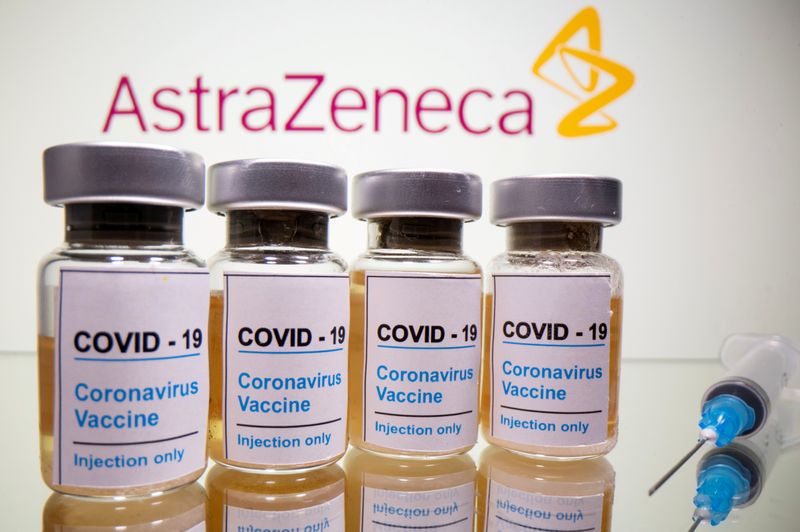By Kate Kelland
LONDON (Reuters) - AstraZeneca and Oxford University have more work to do to confirm whether their COVID-19 vaccine can be 90% effective, a peer-reviewed paper in The Lancet showed on Tuesday, potentially slowing its rollout in the fight against the pandemic.
Once seen as the frontrunner in the development of a vaccine against the coronavirus crisis, the British team was overtaken by U.S. drugmaker Pfizer (NYSE:PFE), whose shots - with a success rate of around 95% - were administered to UK pensioners on Tuesday in a world-first hailed as V-Day.
Detailed results from the AstraZeneca/Oxford vaccine trials have been eagerly awaited after some scientists criticised a lack of clarity in an initial announcement last month.
But the Lancet publication gave few extra clues as to why efficacy was 62% for trial participants given two full doses, but 90% for a smaller sub-group given a half, then a full dose.
"(This) will require further research as more data becomes available from the trial," the researchers said.
John Moore, virologist at Weill Cornell Medical College in New York, said the team's Lancet paper was "a hotchpotch of factoids and is hard to digest".
Ian Jones, a professor of virology at Reading University in England, said that while Tuesday's data added "flesh to the bones" of the release last month, "further trial data might be needed to explain why the lower dose group was significantly better protected than the standard dose group."
Asked whether the half, then full dose regimen had been a mistake, Andrew Pollard, director of the Oxford Vaccine Group and chief investigator into the trials, said it had been "unplanned."
Less than 6% of UK trial participants were given the lower dose regimen and none of them was aged over 55, meaning more studies will be needed to investigate the vaccine's efficacy in older people who are particularly susceptible to COVID-19.
Pooling the results, overall efficacy was 70.4%, the data on Tuesday showed. That is above the 50% minimum set by the U.S. Food and Drug Administration.
COVID-19 vaccines from Pfizer and its German partner BioNTech and from Moderna (NASDAQ:MRNA) have reported efficacy levels of more than 90% in late stage trials.
But the AstraZeneca/Oxford vaccine had been seen as potentially important in tackling the COVID-19 pandemic in the developing countries, as it would be cheaper and easier to distribute if and when it is approved by regulators.
"The overall efficacy across the trials ... reported here is about 70%, but with a clear description of its uncertainty," said Stephen Evans, a professor of pharmacoepidemiology at the London School of Hygiene & Tropical Medicine.
He said that uncertainty meant efficacy could be as low as 55% or as high as 80%.
NEW TRIAL?
Mene Pangalos, head of AstraZeneca's non-oncology research and development, said requests for regulatory approval around the globe could still be submitted this year.
"We hope that once the regulatory authorities review the data, we can get approval any time from the completion of the submission, which could be any time from the end of this year to early next year," he said.
However, Pollard conceded the different results from the two dosage regimens complicated matters.
"The regulators will decide exactly what their label should say," he said, when asked whether regulators might approve the two full shots regiment first, and then potentially the half- then-full shot regimen when more data is in.
Pangalos also said he assumed U.S. regulators would want to see results from an ongoing trial in the United States before giving their approval.
He left it open whether a costly new trial was needed, as the company previously said was likely, because more infections in the ongoing trials may provide the needed clarity.
"We haven’t yet decided on what a next study would be, if we do a next study ... we will decide in due course."
SAFETY FIRST
Pfizer on Tuesday cleared the next hurdle in the race to get its vaccine approved for U.S. emergency use after the Food and Drug Administration (FDA) released documents that raised no new issues about its safety or efficacy.
The Oxford researchers, in turn, said their vaccine was found to be safe, with three out of the roughly 23,700 participants experiencing serious side effects that were possibly related to either the COVID-19 vaccine or the standard meningitis vaccine that was given to control groups.
A case of a serious neurological illness, transverse myelitis, was reported 14 days after a COVID-19 vaccine booster shot, which was "possibly related to vaccination," they said.
That case led to a seven-week trial suspension in the United States and brief halts in trials in other countries.
"The important thing today is that we have put all of our data into a publication in the Lancet which has been peer reviewed and been through that scientific scrutiny," Pollard told Reuters in an interview.

"It's not only available for the scientific community to see exactly how the trials are constructed and what happened, but also ... it's there for the public."